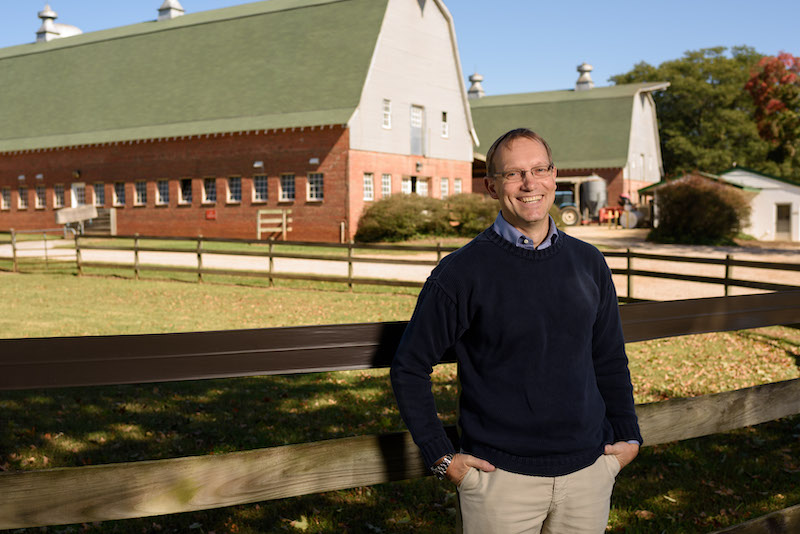Blikslager Honored with AVMA Clinical Research Award

After Amanda Ziegler graduated from the NC State College of Veterinary Medicine, she didn’t want to wait long to begin a career in research. Because of Anthony Blikslager, she didn’t have to.
When Ziegler joined Blikslager’s laboratory as a Ph.D. student in 2015, Blikslager gave her the opportunity to lead a nationwide, multi-institutional clinical trial in equine colic management. He watched from the sidelines as she collected and analyzed data, providing advice and assistance while needed.
Ziegler eventually transformed the research into a study published by a major veterinary journal. She was the face of the study when it was presented on the international veterinary stage.
“He graciously turned over the reins of such a challenging, impactful and rewarding endeavor to me, a junior veterinarian scientist,” says Ziegler. “This is a testament to the value that Dr. Blikslager not only puts in conducting good science and cutting-edge research, but also in fostering the growth of future leaders in clinical science.”
Today, Ziegler is, like Blikslager, a clinician-scientist. She’s a research assistant professor at the CVM, in the Comparative Gastroenterology Lab founded by Blikslager.
In his 30 years at the CVM, Blikslager has been a veterinary triple threat — a tireless equine surgeon, a groundbreaking researcher of equine colic and gastroenterology with a worldwide impact, and a steadfast mentor for the countless veterinarians he helps train.
Last week, Blikslager received the 2020 American Veterinary Medical Association Clinical Research Award. Launched in 1955, it is one of the AVMA’s top honors, recognizing extraordinary patient-oriented — and game-changing — research. Brian Gilger, professor of ophthalmology at the CVM, earned the honor in 2018.
“This award was completely out of the blue, but such a nice surprise,” says Blikslager, professor of equine surgery and gastroenterology at the CVM. “I can’t describe how much it means to me to be recognized in this way that connects all the dots between pretty much anything I’ve done in the clinic with my clinical research.”
Immediate and Lasting Impact
Blikslager’s surgical skill has saved countless lives. His research will save even more.
After arriving at CVM in 1990 for a large animal residency, his clinical specialty quickly became equine colic, one of the most common conditions in horses and one of the most deadly. His first clinical study at NC State was investigation into equine strangulating lipomas, abdominal tumors that, while technically benign, can be fatal because they can wrap around the intestine.
When he began his residency, survival rates hovered below 50% for colic, which generally refers to abdominal pain but encompasses any type of gastrointestinal disorder. No two colic cases are the same, and pinpointing causes and surgical targets continues to be challenging.
“I just had this perhaps simplified view of trying to do research that would increase survival rates,” says Blisklager. “Because of the work of veterinarians around the world, survival went up to about 80%. But even with that increase in survival, I kept wanting to study things that could be essentially tinkered with, to incrementally improve it even more.”
That drive still guides Blikslager’s work. Early in his career, his research focused on developing a basic understanding of equine colic and gastrointestinal disease, leading to more effective treatments. Later, he centered on medical management of gastrointestinal ischemia, a lack of blood flow to the intestines that’s associated with colic, as well as determining underlying factors in colic and pain management.

Blikslager’s research has led to two patents that established ways to treat gastrointestinal mucosal injuries. His studies into nonsteroidal anti-inflammatory drugs (NSAIDs) changed people’s perception of how they can aid in equine pain management.
“It’s always been about what we can do to help horses recover faster after we help them,” says Blikslager. “Anything I’ve ever studied has that goal in mind. It’s always been about doing all we can and also asking what we can do better.”
His research is beyond prolific. Of his more than 200 publications in gastrointestinal biology, more than half have outlined clinical discoveries, are reviews of equine surgery and medicine or clinical editorials.
Blikslager accomplished all of this while managing other duties at the CVM. After completing his residency in 1994, he joined the CVM staff as an emergency clinical instructor the same year. He earned a Ph.D. in gastrointestinal physiology from NC State in 1997 and was named a research assistant professor of equine surgery the following year.
He served as director of the CVM’s equine health program from 2005 to 2008 and chief of the equine medicine and surgery service from 2015 to 2018. This year, Blikslager was named head of the CVM’s Department of Clinical Sciences.
CVM Associate Dean for Research and Graduate Studies Kate Meurs has had a front-seat for Blikslager’s career. She was an intern at the NC State Veterinary Hospital when Blikslager began his residency at the college. She nominated Blikslager for the AVMA honor.
“His research moves from the clinic to the laboratory bench and back to the clinic for applied clinical trial studies,” Meurs wrote in her nomination letter “He is truly an exceptional clinical-scientist, veterinary surgeon and mentor.”
‘Keep Going and Going’
Liara Gonzalez, assistant professor of gastroenterology and equine surgery and the CVM, has counted Blikslager as a mentor since coming to the CVM for her own large animal residency in 2007.

Her Intestinal Regenerative Medicine Lab conducts research on the therapeutic use of intestinal stem cells to treat animal and human gastrointestinal disease, an approach Blikslager has long encouraged. The two often collaborate on research projects, and Gonzalez continues to be inspired by Blikslager’s unwavering commitment to advancing veterinary medicine.
“Dr. Blikslager epitomizes the clinician-scientist who serves as a role model that inspires and lifts up everyone around him,” says Gonzalez. “It has always been so exciting and rewarding to work alongside him and to see first-hand how one person can positively influence an entire field.”
Blikslager’s influence has branched out to human medicine. In the past 10 years, he has been a leading advocate for the use of large animals as translational models for a range of human health problems, especially gastrointestinal disease. Such animal diseases often mirror their human counterparts.
In 2017, he was part of an intercollegiate research team earning a grant to develop treatments for human and animal esophageal diseases, including cancer. Blikslager and Gonzalez are among the CVM faculty involved in the Center for Gastrointestinal Biology and Disease, a research collaborative founded by NC State and UNC-Chapel Hill.
Blikslager’s current research project is strongly translational. When he started his Ph.D. program, Blikslager visited UNC’s School of Medicine and met with a pediatric gastroenterologist strongly interested in the role nutrition could play in helping children with intestinal disease.
That meeting nearly 30 years ago has stayed with him, and Blikslager has since connected it to his observations that newborn animals have far lesser capacity to respond to intestinal injury than older animals.
His research moves from the clinic to the laboratory bench and back to the clinic for applied clinical trial studies. He is truly an exceptional clinical-scientist, veterinary surgeon and mentor.
The new project, funded by the National Institutes of Health and the United States Department of Agriculture, is exploring how changes to nutrition can help animals with intestinal disease and seeing if the findings can cross over to human health.
“We feel like if we can figure out nutritional refinement for younger animals, then hopefully for human infants we can strengthen the gut and make sure that if they get some sort of intestinal injury that they could repair it much faster,” says Blikslager.
Blikslager is always energized by the potential for discoveries, but when he reflects on the most rewarding part of his career, he goes back to working with students like Ziegler. It’s their success that makes him feel successful.
“I always have felt like whoever I’m talking to — could be a veterinary student, could be one of my own kids — anything that I can ever really say that will pay off is just hard work,” says Blikslager. “You just keep working at it and keep going and going and going.”
~Jordan Bartel/NC State Veterinary Medicine


